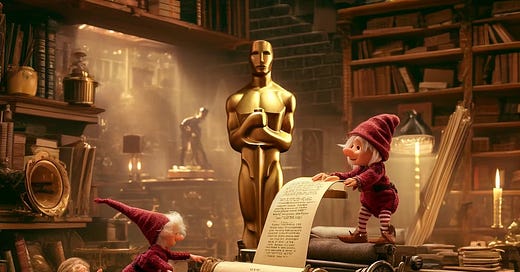Stephen Fry on Words Words Words
Where do they come from? https://stephenfry.substack.com/p/words-words-words
I’m so crazy about Stephen Fry, and I have been since the 1990s, watching Stephen Fry and Hugh Laurie in “Jeeves and Wooster.” They were hilarious. And you might not be aware that P.G. Wodehouse was writing to improve British morale between the wars.
The Guardian says: “Countless readers of Wodehouse have testified to the way his novels have their own "stimulating effect" on morale, providing not just comic, but almost medicinal effects: the exiled Kaiser Wilhelm, after his defeat in the first world war, consoled himself by reading Wodehouse to his "mystified" staff; the late Queen Mother allegedly read "The Master" on a nightly basis, to set aside the "strains of the day"; more recently, news reports tell of the imprisoned Burmese comedian Zargana finding comfort in Wodehouse during solitary confinement. "Books are my best friends", he confided. "I liked the PG Wodehouse best. Joy in the Morning – Jeeves, Wooster and the fearsome Aunt Agatha. It's difficult to understand, but I've read it three times at least. And I used it as a pillow too." https://www.theguardian.com/books/2011/nov/04/pg-wodehouse-life-in-letters
Sophie Ratcliffe Fri 4 Nov 2011 18.55 EDT
I was fascinated by that and fascinated by the inane comedic stylings of Fry and Lawrie. I’m not the only one; they were enormously popular in England. Imagine my shock when I saw the first episode of House with Bertie Wooster playing a nasty old man!
Stephen Fry, in his post about writing, says “I used to have on my Twitter bio the phrase, “How can I tell you what I think until I’ve heard what I’m going to say?” I could equally as well have had “How can I tell you what I’m going to write until I’ve written it?”
This seems so seminal to the work we do as transcriptionists. We’re capturing those words as they first appear—the speaker’s first—or maybe fiftieth pass at speaking aloud what he’s thinking. That’s our job—to listen carefully, observantly, and capture all the nuances that help the speaker elucidate what he’s thinking!
In his latest blog post, Words words words Where do they come from?
He muses about writing and putting his thoughts into words.
He ends with a joke—one that is as applicable to AI as it is to elves.
Which brings me to a fine Hollywood joke.
Elwood is a screenwriter, and he has been commissioned for a script, his first. The studio has set a deadline of two months. Seven weeks have passed now, and he is getting desperate. Every day, he sits at his computer and tries to type. But he isn’t a third of the way in. Completely stuck.
Elwood stands, sits, kicks the walls. Goes for short walks. Goes for long walks. Nothing comes. He realises that he is either going to have to plead for an extension or pay back the studio’s commission. The night before delivery is due, he sits in his armchair and stares malevolently at the computer. He knows he has to work all night at something, but instead, he falls asleep.
He is awoken at three in the morning by the sound of typing. He opens his eyes and cannot believe what he sees. Two elves are bouncing up and down on the keyboard. Five more elves take pages out of the printer and carefully stack them into a neat sheaf.
‘What are you doing? What’s going on?’ cries Elwood.
‘We’re elves, and we’re writing your screenplay for you.’
‘Wh … ? Huh?’
‘It’s what we do. There aren’t so many shoemakers around these days, so we help out script makers instead.’
‘Yes, but scripts have to have stories…’ Elwood picks up the top page on the sheaf, ‘…and characters and plot twists…’ his voice trails off. The script is good—very good. He takes another piece of paper and another. It’s better than he could possibly have imagined. In fact, it’s brilliant.
He tells them so. ‘Guys, this is amazingly good!’
‘Happy to help, sir.’
‘Can I get you anything? Food, drink?’
‘No, no, we’re ok. Just have three more scenes to finish and then we’re done and we’ll leave you be.’
They are as good as their word. Twenty minutes later Elwood has in his hands a completed screenplay of dazzling quality and originality.
He sends it off to his agent first thing in the morning. A day and a half later, he hears back. The studio is beyond impressed and pleased, and they want a five-picture contract with Elwood. They offer a sum of money that knocks him sideways with joy.
Six months later, he is sitting in his armchair watching script number three chug from the printer. There is now an Oscar on his mantelpiece. Elves are bouncing on the keyboard. All is well.
‘Guys,’ says Elwood for the hundredth time, ‘Are you sure there’s nothing I can get you? Coffee, cookies, marshmallows, anything?’
‘Seriously, we’re good … just happy doing our job.’
‘But money. Surely some money? I’ll give you half, two-thirds of what I’m earning. It’s only fair.’
‘Kind thought, but we don’t use money…’
‘Tell you what though …’ one of the elves on the keyboard stops bouncing up and down, ‘I suppose there is one thing …’
‘Name it!’ says Elwood, thrilled that there might be any means of repayment.
‘You might consider …’ said the elf, ‘that is to say … if we could have, maybe, a screen credit?’
‘Are you out of your fucking minds? Fuck you!’
Muse or Muses, elves, genies, djinns or sprites, no matter how mysterious or even mystical the process of writing may be, no matter how varied the sources of ‘inspiration’, we will take all the credit going, thank you very much.




